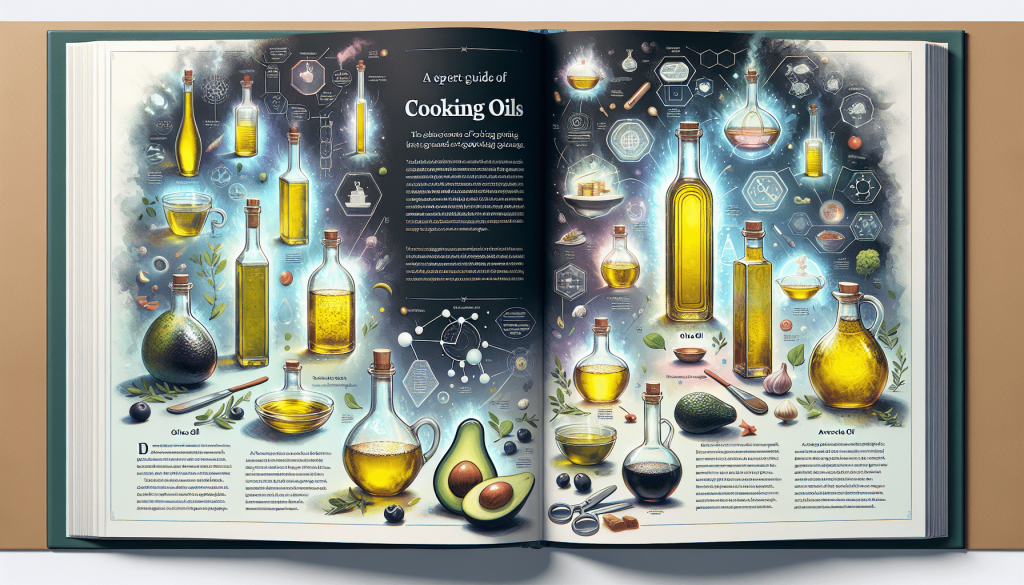In this article, you will discover the secrets to selecting the perfect cooking oil for your dish. Whether you’re a seasoned chef or an amateur in the kitchen, choosing the right oil can make all the difference in the taste and texture of your food. We will explore various factors to consider, such as smoke point, flavor profile, and health benefits. By the end of this article, you’ll be equipped with the knowledge to confidently select the ideal cooking oil for any culinary masterpiece you’re about to create.
Consider the Cooking Method
When choosing a cooking oil, one of the first things to consider is the cooking method you’ll be using. Different oils have different smoke points, which is the temperature at which the oil starts to smoke and break down.
Frying
If you’re planning to fry food, it’s important to choose an oil with a high smoke point. Oils like peanut oil, canola oil, and sunflower oil are great options for deep frying as they can withstand the high temperatures without smoking. Their high smoke points ensure that your food will be cooked evenly and have a crisp outer layer.
Sauteing
When it comes to sautéing, you want an oil with a medium-high smoke point. This cooking method involves cooking food quickly over high heat in a shallow pan. Olive oil, vegetable oil, and avocado oil are all good choices for sautéing, as they can withstand the heat without smoking. Plus, they add a delicious flavor to your dishes.
Baking
If you’re baking, you may not need to use as much oil as in frying or sautéing. Olive oil and coconut oil are great options for baking, as they add moisture and flavor to your baked goods. Just be sure to use extra virgin olive oil for its rich taste and low acidity.
Roasting
Roasting is a fantastic way to bring out the natural flavors of vegetables and meats. When roasting, it’s best to choose an oil with a high smoke point, such as vegetable oil, grapeseed oil, or avocado oil. These oils can withstand the high temperatures of roasting and will help your ingredients develop a delicious golden crust.
Understand Smoke Point
Defining Smoke Point
The smoke point of an oil refers to the temperature at which it begins to smoke and break down. When an oil reaches its smoke point, it releases potentially harmful compounds and becomes less stable. This can affect the taste, nutritional value, and safety of your cooking oil.
Importance of Smoke Point
The smoke point is an important factor to consider when choosing a cooking oil because it determines how well the oil performs at high temperatures. Oils with low smoke points, such as butter or extra virgin olive oil, are not suitable for high-heat cooking methods like frying or roasting. Using an oil with a low smoke point can lead to burned or rancid flavors in your food and may even release harmful compounds.
On the other hand, oils with higher smoke points, like canola oil or peanut oil, are better suited for frying and high-heat cooking. These oils can withstand the heat without smoking, ensuring that your food cooks evenly and without any unpleasant flavors.

Know the Nutritional Content
Types of Fats
When it comes to the nutritional content of cooking oils, it’s important to understand the types of fats they contain. There are three main types of fats: saturated, unsaturated, and trans fats.
Saturated fats are solid at room temperature and are typically found in animal products like butter and lard. They are generally considered less healthy and should be consumed in moderation.
Unsaturated fats are liquid at room temperature and can be divided into two categories: monounsaturated and polyunsaturated fats. Monounsaturated fats, found in oils like olive oil and avocado oil, are considered healthier fats as they can help reduce bad cholesterol levels.
Omega-3 and Omega-6 Fatty Acids
Some oils, such as flaxseed oil and fish oil, are rich in omega-3 fatty acids. These fatty acids are essential for our bodies and have been shown to have various health benefits, including reducing inflammation and promoting heart health.
On the other hand, oils like corn oil and soybean oil are high in omega-6 fatty acids. While omega-6 fatty acids are also important, excessive consumption can lead to an imbalance with omega-3 fatty acids and potentially increase inflammation in the body.
Consider the Flavor
Neutral Flavored Oils
When you want the flavor of your dish to shine through, it’s best to use a neutral flavored oil. Oils like vegetable oil, canola oil, and grapeseed oil have a mild taste that won’t overpower the other ingredients in your dish. These oils are versatile and can be used in a wide range of recipes, from stir-fries to baking.
Strong Flavored Oils
On the other hand, if you’re looking to add a specific flavor profile to your dish, you may want to use a strong flavored oil. Oils like extra virgin olive oil, sesame oil, and walnut oil have distinct tastes that can enhance the overall flavor of your dish. For example, a drizzle of extra virgin olive oil can elevate a simple salad, while sesame oil adds an unmistakable nutty flavor to stir-fries.

Consider the Health Benefits
Heart-Healthy Oils
When it comes to the health benefits of cooking oils, some oils stand out for their positive impact on heart health. Olive oil, especially extra virgin olive oil, is a staple of the Mediterranean diet and has been shown to reduce the risk of heart disease. Avocado oil is another heart-healthy oil that is rich in monounsaturated fats and vitamin E, both of which are beneficial for cardiovascular health.
Antioxidant-rich Oils
Certain oils, such as coconut oil and extra virgin olive oil, are rich in antioxidants. These antioxidants help to fight inflammation and oxidative stress in the body. Choosing oils that are high in antioxidants can contribute to a healthy and balanced diet.
Consider the Stability
Oxidative Stability
Oils can undergo oxidative reactions when exposed to heat or light, leading to the production of harmful compounds. It’s important to choose oils that have good oxidative stability, meaning they are less likely to break down and produce these compounds.
Oils with higher levels of saturated fats, like coconut oil or palm oil, tend to be more stable and less prone to oxidation. On the other hand, oils high in polyunsaturated fats, such as soybean oil or sunflower oil, are more susceptible to oxidation and should be stored properly to maintain their quality.
Polyunsaturated Fats and Stability
Some oils are particularly high in polyunsaturated fats, which are essential fatty acids that our bodies cannot produce. While these fats are important for our health, they are also more vulnerable to oxidation. Oils like fish oil and flaxseed oil are rich in omega-3 fatty acids but can easily spoil if not stored properly.
Avoid Allergens and Sensitivities
Common Allergenic Oils
For individuals with allergies or sensitivities, it’s important to be aware of common allergenic oils. Peanut oil, soybean oil, and tree nut oils like almond oil are some examples of oils that can trigger allergic reactions in susceptible individuals. It’s crucial to read labels carefully and be mindful of potential allergens when choosing cooking oils.
Alternative Oils for Allergies
Luckily, there are plenty of alternatives available for individuals with allergies or sensitivities. Sunflower oil, olive oil, and avocado oil are all great options that are generally well-tolerated by most people. These oils offer similar cooking properties and can be used as substitutes in a variety of recipes.
Consider the Cost
Comparing Prices
When choosing a cooking oil, cost is often a consideration. Some oils, like extra virgin olive oil or avocado oil, may be more expensive than others due to factors such as production methods or sourcing. However, it’s important to weigh cost against quality and health benefits.
Balancing Cost and Quality
While it may be tempting to opt for the cheapest oil available, it’s important to consider the quality and health benefits associated with the oil. Investing a bit more in a high-quality oil, such as extra virgin olive oil or organic coconut oil, can make a noticeable difference in the flavor and nutritional content of your dishes.
Storage and Shelf Life
Proper Storage
To ensure the longevity and quality of your cooking oils, proper storage is key. Oils should be stored in a cool, dark place away from direct sunlight. Exposure to heat, light, and air can cause oils to degrade more quickly, leading to a shorter shelf life and potentially rancid flavors.
Shelf Life Considerations
Different oils have different shelf lives based on their fatty acid composition and processing methods. Refined oils, like canola oil or vegetable oil, generally have a longer shelf life due to the removal of impurities. On the other hand, oils like flaxseed oil or walnut oil have a shorter shelf life due to their higher levels of polyunsaturated fats.
Sustainability and Environmental Impact
Considerations for Sustainable Oils
With growing concerns about environmental impact, it’s important to consider the sustainability of the oils we use. Palm oil, for example, has been associated with deforestation and habitat destruction in some regions. Opting for sustainably sourced oils, such as certified sustainable palm oil or oils made from locally grown crops, can help minimize your environmental footprint.
Eco-friendly Production Methods
In addition to sustainability, considering the production methods of cooking oils can also have an impact. Cold-pressed or expeller-pressed oils typically involve mechanical methods rather than chemical extraction, making them a more eco-friendly choice. Additionally, choosing oils that are produced locally can help reduce carbon emissions associated with transportation.
In conclusion, choosing the right cooking oil for your dish involves considering various factors such as the cooking method, smoke point, nutritional content, flavor, health benefits, stability, allergens, cost, storage, and sustainability. By being mindful of these factors and making informed choices, you can enhance the flavor and nutritional value of your dishes while also considering your health and the environment. Happy cooking!
